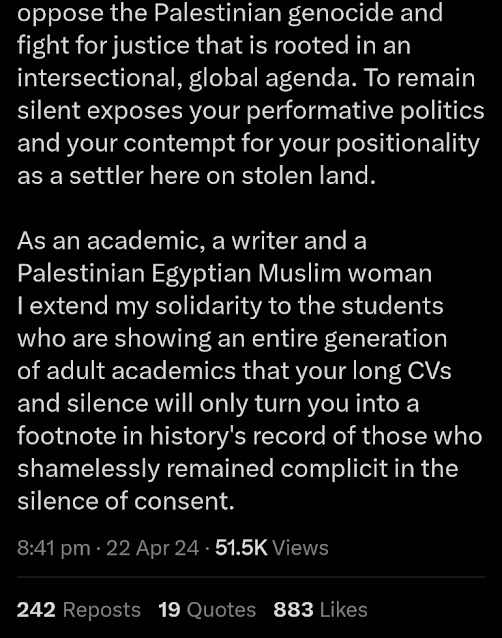I've seen a couple of episodes of Michael Palin's 2022 TV series (currently being run on SBS) in which he travelled through Iraq. It does indeed have some impressive sites - I was surprised at the scale of the (somewhat gaudy) opulence of the big shrine at Karbala, for example. You can see that here:
If only it was a safe country to visit, one can imagine that it might make money from tourism.
But as this story in the New York Times shows, Iraq is another country where religious conservativism is fighting back against more liberal attitudes, with tragic consequences:
It took less than 46 seconds for the helmeted assassin to pull over his motorcycle, walk to the driver’s side of the S.U.V., yank open the door and fire his handgun four times, killing one of Iraq’s most prominent TikTok personalities, a 30-year-old woman whose name on social media was Um Fahad.
The security camera footage of the killing in front of a Baghdad home on Friday evening is startlingly explicit but sheds little light on either the killer’s identity or the reason Um Fahad was targeted. The Iraqi Interior Ministry, which released the video, said it had formed a committee to investigate her death.
The victim, whose real name was Ghufran Mahdi Sawadi, had become popular on social media sites, especially TikTok and Instagram, where her videos showed her wearing tight or revealing clothing, or singing and cuddling her young son. They won her some 460,000 followers, but also drew the ire of conservatives in Iraqi society and in the government.At one point, officials ordered Ms. Sawadi jailed for 90 days, reprimanding her for a post that showed her dancing at her 6-year old son’s birthday party.
....
Ms. Sawadi’s killing was the third in less than a year in Iraq of a young social media personality.
The killings appear to have been an outgrowth of an Iraqi clampdown on criticism of the government and on the public display of behaviors regarded as secular and Western, according to human rights groups.The stricter social media regulations came in the wake of youth uprisings that began in 2019 and challenged corruption in the Iraqi government and the influence of Iran. Today, the Iraqi government is dominated by parties with links to Iran, and many have a strong religious orientation.
The most recent addition to the list of prohibited activities was contained in legislation approved by the Parliament over the weekend. The country’s anti-prostitution law now targets gay, bisexual and transgender Iraqis, making it a crime to have homosexual relations, punishable by 10 to 15 years in prison. Assisting in gender transition treatment would also be a crime.
The Parliament’s acting speaker, Mohsen al-Mandalawi, described the law as “a necessary step to protect the value structure of society, and in the higher interest of protecting our children from calls to immorality and homosexuality that are now invading countries.”
I won't be visiting the place any time soon.


%20Randa%20Abdel-Fattah%20(@RandaAFattah)%20_%20X.png)






%20Prof%20Sandy%20O'Sullivan%20(Wiradjuri)%20%F0%9F%87%B5%F0%9F%87%B8%F0%9F%87%B5%F0%9F%87%B8%F0%9F%87%B5%F0%9F%87%B8%20(@sandyosullivan)%20_%20X.png)
%20Dr.%20Laura%20Robinson%20on%20X%20Naomi%20Wolf%20has%20evolved%20into%20her%20final%20form%20a%20seminarian%20with%20six%20weeks%20of%20Greek%20who%20thinks%20the%20entire%20New%20Testament%20has%20been%20translated%20wrong.%20_%20X.png)
%20Dr.%20Laura%20Robinson%20on%20X%20Naomi%20Wolf%20has%20evolved%20into%20her%20final%20form%20a%20seminarian%20with%20six%20weeks%20of%20Greek%20who%20thinks%20the%20entire%20New%20Testament%20has%20been%20translated%20wrong.%20_%20X.png)
%20Dr.%20Laura%20Robinson%20on%20X%20Naomi%20Wolf%20has%20evolved%20into%20her%20final%20form%20a%20seminarian%20with%20six%20weeks%20of%20Greek%20who%20thinks%20the%20entire%20New%20Testament%20has%20been%20translated%20wrong.%20_%20X.png)
%20Dr.%20Laura%20Robinson%20on%20X%20Naomi%20Wolf%20has%20evolved%20into%20her%20final%20form%20a%20seminarian%20with%20six%20weeks%20of%20Greek%20who%20thinks%20the%20entire%20New%20Testament%20has%20been%20translated%20wrong.%20_%20X.png)
%20New%20York%20Times%20Pitchbot%20(@DougJBalloon)%20_%20X.png)
%20George%20Conway%20on%20X%20%E2%80%9CThings%20have%20changed%20a%20lot%20since%20I%20talked%20to%20folks%20outside%20of%20Trump%E2%80%99s%202016%20rally%20in%20Chester%20County%20when%20they%20were%20intrigued%20by%20Trump%E2%80%99s%20not-a-politician%20blust%5B...%5D.png)
%20George%20Conway%20(@gtconway3d)%20_%20X.png)
%20Tom%20Joseph%20on%20X%20Trump%E2%80%99s%20dementia%20deterioration%20is%20very%20evident%20here.%20This%20is%20what%20it%20sounds%20like-%20mindless%20word%20drool.%20He%E2%80%99s%20had%20it%20for%20a%20while%20and%20it%20continuously%20worsens%20so%20he%5B...%5D.png)
%20Tom%20Joseph%20on%20X%20Trump%E2%80%99s%20dementia%20deterioration%20is%20very%20evident%20here.%20This%20is%20what%20it%20sounds%20like-%20mindless%20word%20drool.%20He%E2%80%99s%20had%20it%20for%20a%20while%20and%20it%20continuously%20worsens%20so%20he%5B...%5D.png)
%20Tom%20Joseph%20on%20X%20Trump%E2%80%99s%20dementia%20deterioration%20is%20very%20evident%20here.%20This%20is%20what%20it%20sounds%20like-%20mindless%20word%20drool.%20He%E2%80%99s%20had%20it%20for%20a%20while%20and%20it%20continuously%20worsens%20so%20he%5B...%5D.png)
%20Nancy%20T.%20@OldEnuf2KnowBtr%20on%20P%20st%20on%20X%20@TomJChicago%20I'm%20wondering%20if%20Vegas'%20bookies%20are%20starting%20to%20calculate%20the%20odds%20of%20him%20making%20it%20to%20November.%20_%20X.png)
.jpg)
%20Prof%20Sandy%20O'Sullivan%20(Wiradjuri)%20%F0%9F%87%B5%F0%9F%87%B8%F0%9F%87%B5%F0%9F%87%B8%F0%9F%87%B5%F0%9F%87%B8%20(@sandyosullivan)%20_%20X.png)

%20Will%20Stancil%20(@whstancil)%20_%20X.png)
%20Will%20Stancil%20(@whstancil)%20_%20X.png)






